Google now searches Microsoft Office, PostScript, Corel WordPerfect, Lotus 1-2-3, and others. The new file types will simply appear in Google search results whenever they are relevant to the user query. For example, if you’re looking for the Door Detailing in AutoCAD DWG format, key in door detail filetype:dwg
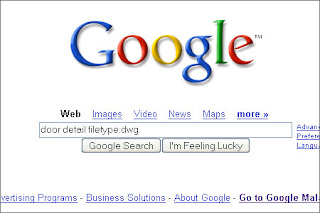 The image above is an example of how it should be done, it need not be door detail filetype:dwg, if you prefer to see a particular set of results with a specific file type (for example, PDF links), simply type filetype:[extension] (for example, filetype:pdf) within the search box along with your search term(s).
The image above is an example of how it should be done, it need not be door detail filetype:dwg, if you prefer to see a particular set of results with a specific file type (for example, PDF links), simply type filetype:[extension] (for example, filetype:pdf) within the search box along with your search term(s).To exclude him from the search results, key in “Pritzker Prize -Paulo Mendes” and Mr.Mendes will not be found in the search results. This feature is useful when you’re searching for certain context that seems to return irrelevant results.
2. Google Translate
This is one of the best tools by Google. Assuming that you’ve just completed your architectural project and to wrap it up you need a name, something catchy and striking. We all know that English term are over used, I’m not saying that English terms are boring, just that it gives an impression of formality.
French words are romantic, music to the ears and the best part is not many people understand the language, let alone speak, which makes it exotic.
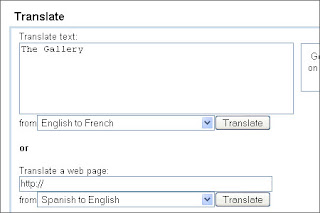 Try Google Translate, for example if you’re given the task to name the newly proposed show unit, key in The Gallery in Google Translate.
Try Google Translate, for example if you’re given the task to name the newly proposed show unit, key in The Gallery in Google Translate.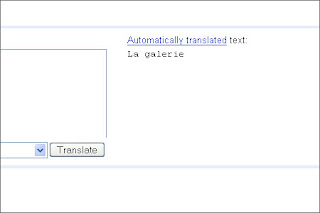 There you go, it is La galerie and isn’t it much better than the English term “The Gallery’? There are other alternatives besides French, Spanish and Italian terms are kind of interesting too.
There you go, it is La galerie and isn’t it much better than the English term “The Gallery’? There are other alternatives besides French, Spanish and Italian terms are kind of interesting too.3. Google Calculator
The Pandora box of Google Search, if you happen to be a lazy fellow like me with problems memorizing those magical numbers, converting one units to another is now as easy as 123.
What is 1 meter in feet? Simply ask Google.
What is 1 meter in feet? Simply ask Google.
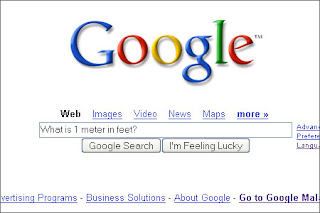
 To use Google’s built-in calculator function, simply enter the calculation you’d like done into the search box and hit the Enter key or click on the Google Search button. The calculator can solve math problems involving basic arithmetic, more complicated math, units of measure and conversions, and physical constants.
To use Google’s built-in calculator function, simply enter the calculation you’d like done into the search box and hit the Enter key or click on the Google Search button. The calculator can solve math problems involving basic arithmetic, more complicated math, units of measure and conversions, and physical constants.These sample queries demonstrate the utility and power of this new feature:
• 5+2*2
• 2^20
• sqrt(-4)
4. Google Sketchup and Google Earth
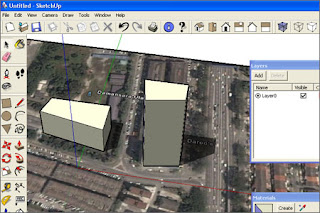 Sun study in an important part of architecture, a good building orientation will greatly reduce the need for mechanical ventilation, combination of Google Sketchup and Google Earth gives the end user the ability to determine the sun angle thru out the year.
Sun study in an important part of architecture, a good building orientation will greatly reduce the need for mechanical ventilation, combination of Google Sketchup and Google Earth gives the end user the ability to determine the sun angle thru out the year.1. Snap pictures of the surrounding buildings.
2. Save a screenshot of the zoom in area in Google Earth
3. Import the Google Earth image into Google Sketchup
4. Start drawing the existing building accordingly.
5. Enable shadow to study the sun orientation.
5. Google Calendar
This new feature from Google allows you to organize your daily routine for free, with today’s unlimited broadband, Google Calendar can be a reminder of deadlines for ongoing projects and of course friends and family’s birthday.
This new feature from Google allows you to organize your daily routine for free, with today’s unlimited broadband, Google Calendar can be a reminder of deadlines for ongoing projects and of course friends and family’s birthday.
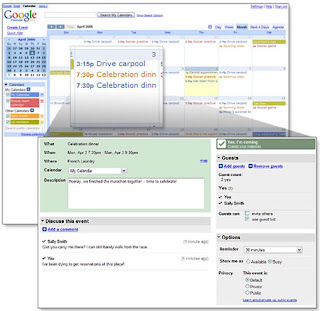
6. Google Docs and Spreadsheets
Create and share your projects online and access them from anywhere. You may have a pendrive but certain Colleges and Universities don’t allow pendrive for fear of virus. Anyway, what you need to do is type your report with this online Docs (alternative to Microsoft Word) and Spreadsheets (alternative to Microsoft Excel) and save it online. If I’m a lecturer, I’ll definitely force my students to compile their report with Google Docs, no more excuses such as forgot to bring my pendrive or the computer in the labs couldn’t read my pendrive.
Create and share your projects online and access them from anywhere. You may have a pendrive but certain Colleges and Universities don’t allow pendrive for fear of virus. Anyway, what you need to do is type your report with this online Docs (alternative to Microsoft Word) and Spreadsheets (alternative to Microsoft Excel) and save it online. If I’m a lecturer, I’ll definitely force my students to compile their report with Google Docs, no more excuses such as forgot to bring my pendrive or the computer in the labs couldn’t read my pendrive.
7. Google Scholar
Stand on the shoulders of giants. Google Scholar is the best place to search for information. Remember, copy from one is plagiarism, copy from two is research.
Google Scholar provides a simple way to broadly search for scholarly literature. From one place, you can search across many disciplines and sources: peer-reviewed papers, theses, books, abstracts and articles, from academic publishers, professional societies, preprint repositories, universities and other scholarly organizations. Google Scholar helps you identify the most relevant research across the world of scholarly research.
8. Google Base
This is the place where you go when you’re desperate. It is suppose to be the next ebay, unlike ebay which do not permit selling of services or non-physical goods, Google Base actually encourage this non-physical services. If you need a 3D rendering to be completed before the end of the week then try Google Base, search for these freelance.


No comments:
Post a Comment